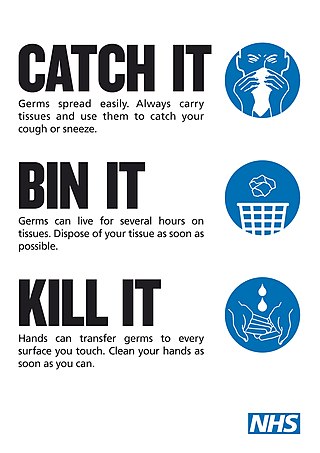
Health in China is a complex and multifaceted issue that encompasses a wide range of factors, including public health policy, healthcare infrastructure, environmental factors, lifestyle choices, and socioeconomic conditions.

The social hygiene movement was an attempt by Progressive era reformers to control venereal disease, regulate prostitution and vice, and disseminate sexual education through the use of scientific research methods and modern media techniques. Social hygiene as a profession grew alongside social work and other public health movements of the era. Social hygienists emphasized sexual continence and strict self-discipline as a solution to societal ills, tracing prostitution, drug use and illegitimacy to rapid urbanization. The movement remained alive throughout much of the 20th century and found its way into American schools, where it was transmitted in the form of classroom films about menstruation, sexually transmitted disease, drug abuse and acceptable sexual behavior in addition to an array of pamphlets, posters, textbooks and films.

World Toilet Day (WTD) is an official United Nations international observance day on 19 November to inspire action to tackle the global sanitation crisis. Worldwide, 4.2 billion people live without "safely managed sanitation" and around 673 million people practice open defecation. Sustainable Development Goal 6 aims to "Ensure availability and sustainable management of water and sanitation for all". In particular, target 6.2 is to "End open defecation and provide access to sanitation and hygiene". When the Sustainable Development Goals Report 2020 was published, United Nations Secretary-General António Guterres said, "Today, Sustainable Development Goal 6 is badly off track" and it "is hindering progress on the 2030 Agenda, the realization of human rights and the achievement of peace and security around the world".

Xi Jinping is a Chinese politician who has served as the general secretary of the Chinese Communist Party (CCP) and chairman of the Central Military Commission (CMC), and thus as the paramount leader of China, since 2012. Xi has also served as the president of the People's Republic of China (PRC) since 2013.

Wang Qishan is a Chinese retired politician who served as Vice President of the People's Republic of China from 2018 to 2023. Wang was one of the leading figures behind China's foreign affairs, along with President Xi Jinping and Premier Li Keqiang. Between 2012 and 2017, Wang had served as the Secretary of the Central Commission for Discipline Inspection, the Chinese Communist Party's internal control and anti-corruption body, and a member of the Politburo Standing Committee of the Chinese Communist Party. He has been instrumental in carrying out General Secretary Xi Jinping's anti-corruption campaign since 2013.

ThePeople's Liberation Army National Defence University is a national public collegiate military university headquartered in Beijing, China with constituent and affiliated military academies nationwide. Established in 1985 by a military order of Deng Xiaoping, the university is under the "institutional leadership" of the Central Military Commission. The university is the highest military education institution of China.

Global Hand washing Day (GHD) is an international hand washing promotion campaign to motivate and mobilize people around the world to improve their hand washing habits. Washing hands at critical points both during the day and washing with soap are important. In 2008, Global Handwashing Day was celebrated for the first time. This day aims to make people around the world aware of the importance of washing their hands with soap in order to prevent diseases and infections. To commemorate this special day, over 120 million children in 70 countries were encouraged to practice handwashing with soap. Since then, the movement has built momentum, garnering support from various stakeholders such as governments, schools, NGOs, and private firms.

Allegations that the United States military used biological weapons in the Korean War were raised by the governments of People's Republic of China, the Soviet Union, and North Korea. The claims were first raised in 1951. The story was covered by the worldwide press and led to a highly publicized international investigation in 1952. Secretary of State Dean Acheson and other American and allied government officials denounced the allegations as a hoax. Subsequent scholars are split about the truth of the claims.

The Xi Jinping–Li Keqiang Administration of the People's Republic of China began in 2013, when Xi Jinping and Li Keqiang succeeded Hu Jintao and Wen Jiabao following the 18th National Congress of the Chinese Communist Party. It is speculated that Xi will solidify the political power of the CCP general secretary, for the absolute command of the Communist ideology over pragmatic approach, and on the economic front, there will be no liberalization but socialist entrenchment.

WASH is an acronym that stands for "water, sanitation and hygiene". It is used widely by non-governmental organizations and aid agencies in developing countries. The purposes of providing access to WASH services include achieving public health gains, improving human dignity in the case of sanitation, implementing the human right to water and sanitation, reducing the burden of collecting drinking water for women, reducing risks of violence against women, improving education and health outcomes at schools and health facilities, and reducing water pollution. Access to WASH services is also an important component of water security. Universal, affordable and sustainable access to WASH is a key issue within international development and is the focus of the first two targets of Sustainable Development Goal 6. Targets 6.1 and 6.2 aim at equitable and accessible water and sanitation for all. In 2017, it was estimated that 2.3 billion people live without basic sanitation facilities and 844 million people live without access to safe and clean drinking water.

School hygiene or school hygiene education is a healthcare science, a form of the wider school health education. The primary aims of school hygiene education is to improve behavior through useful practices connected to personal, water, food, domestic and public hygiene. Also, it aims to protect water and food supplies and to safely manage environmental factors.
The Eight-point Regulation of the Centre is a set of Chinese Communist Party regulations stipulated by the Politburo in 2012 aimed at instilling more discipline among party members and making the party "closer to the masses". They were first announced on 4 December 2012, after a Politburo meeting lead by Xi Jinping, who then had recently became General Secretary of the CCP. Detailed implementing regulations were adopted by the Politburo in 2022.

Emergency sanitation is the management and technical processes required to provide sanitation in emergency situations. Emergency sanitation is required during humanitarian relief operations for refugees, people affected by natural disasters and internally displaced persons. There are three phases of emergency response: Immediate, short term and long term. In the immediate phase, the focus is on managing open defecation, and toilet technologies might include very basic latrines, pit latrines, bucket toilets, container-based toilets, chemical toilets. The short term phase might also involve technologies such as urine-diverting dry toilets, septic tanks, decentralized wastewater systems. Providing handwashing facilities and management of fecal sludge are also part of emergency sanitation.

Xi Jinping Thought on Socialism with Chinese Characteristics for a New Era, commonly abbreviated outside China as Xi Jinping Thought, is a Marxist ideological doctrine based on the writings, speeches and policies of Chinese Communist Party (CCP) general secretary Xi Jinping. It was first officially mentioned at the 19th National Congress of the Chinese Communist Party in 2017, in which it was incorporated into the Constitution of the Chinese Communist Party. At the first session of the 13th National People's Congress on 11 March 2018, the preamble of the Constitution of the People's Republic of China was amended to mention Xi Jinping Thought. It has been officially described by the CCP as the "Marxism of contemporary China and of the 21st century".

Toilet Revolution in China is a government campaign aimed at improving the sanitary conditions in Mainland China. In 2015, Xi Jinping, General Secretary of the Chinese Communist Party, announced that China is going to improve the sanitary conditions of public toilets in tourist attractions, about which foreign travelers have long complained. The "Toilet revolution" entry in the State Council Information Office's 2015 "Dictionary of Xi Jinping's new terms" explains the campaign, "Along with agricultural modernization and new rural construction, local governments will ensure that villagers have access to hygienic toilets." Xi has been praised for his leading role in the campaign.

The concept of Targeted Poverty Alleviation was first raised by Xi Jinping, General Secretary of the Chinese Communist Party to combat poverty in China.
The following lists events that happened during 2020 in China.

"Catch It, Bin It, Kill It" is a slogan used in several public health campaigns of the British government to promote good respiratory and hand hygiene by recommending carrying tissues, using them to catch a cough or sneeze, disposing of them immediately in a waste bin and then killing any remaining viruses by washing hands or using hand sanitiser. In 2007, following evidence that good respiratory and hand hygiene might reduce the spread of flu, the phrase appeared in a government campaign that publicised the directive "Catch it, Bin it, Kill it" throughout the NHS, on buses and trains and in libraries, shopping centres and police stations.

Hygienic Modernity, published in 2004, is an anthropological work in ten chapters by Ruth Rogaski that describes the Chinese conceptualization of hygiene, or weisheng, over the course of a century as a national value as well as the central vehicle for modernization. The book's body of politico-cultural evidence presents the emergence of the medicalized view of China as a sick, deficient nation, weakened by a semicolonial past in the early 1900s, as well as the resulting internalization of said national illness resulting in normative shifts and new policy implements that have changed the urban built environment. This created new semantic meanings of weisheng, which had Chinese cosmological significance prior to the mid-nineteenth century. Rogaski traces the changing meaning of this concept through the case study of the transformation of the treaty-port city of Tianjin, cite of multiple foreign concessions and several of China's first important medical institutions such as the country's first municipal department of health and first medical academy. Hygienic Modernity is in fact Rogaski's own translation of the contemporary meaning of weisheng. This book has been critically acclaimed for its pluralistic perspective, including the subaltern of Tianjin, as well as its transnational scope.















